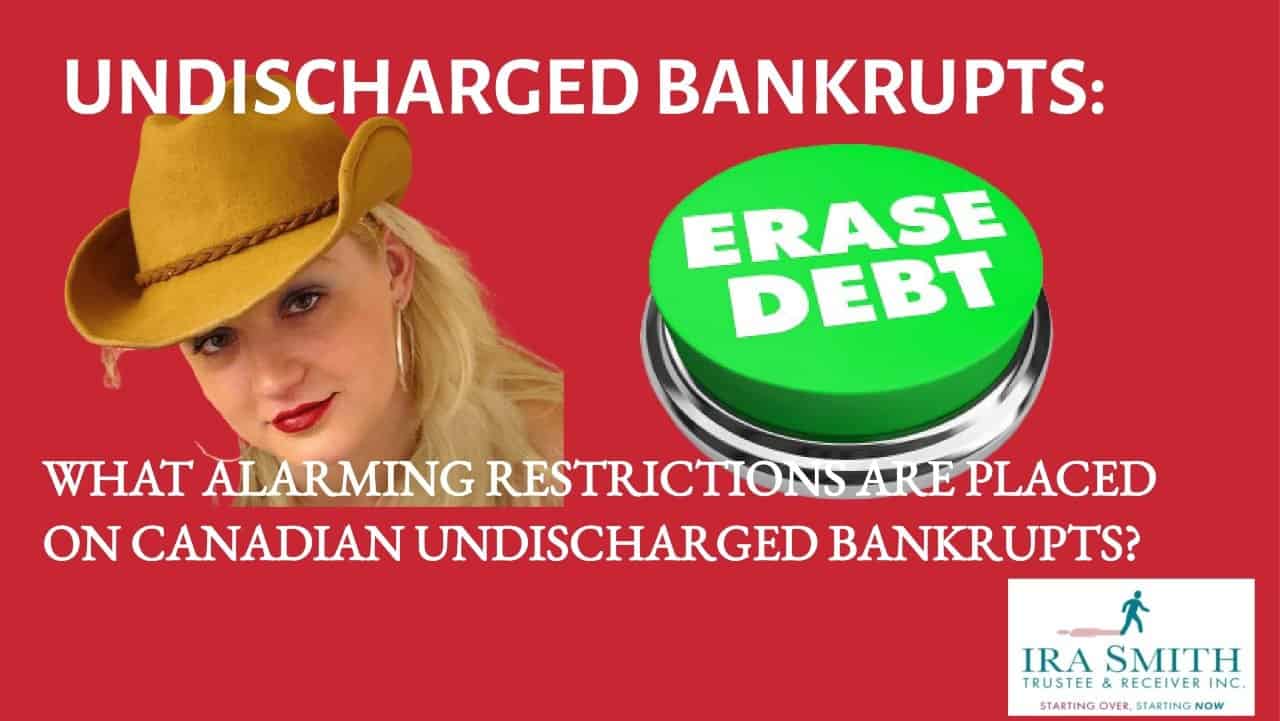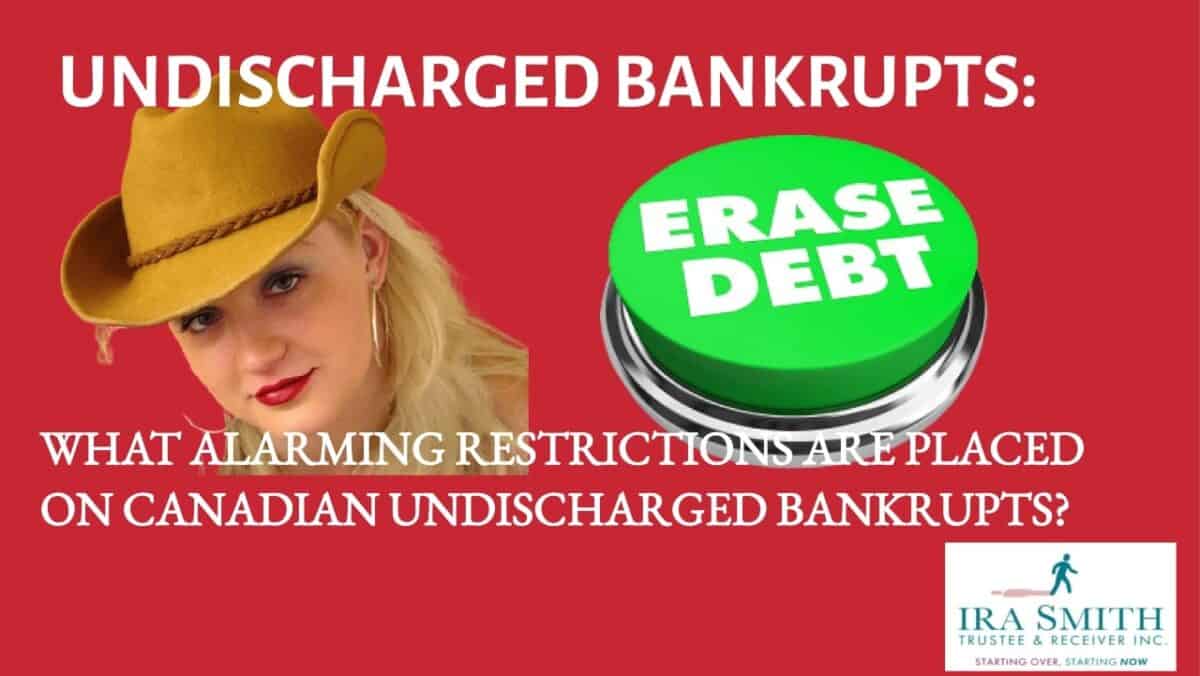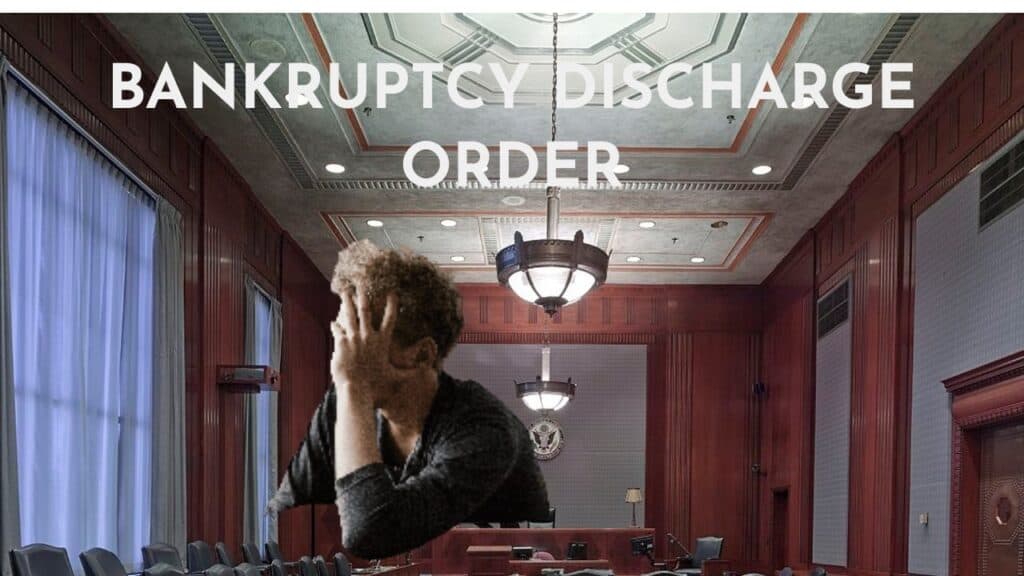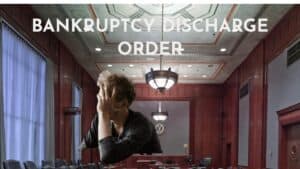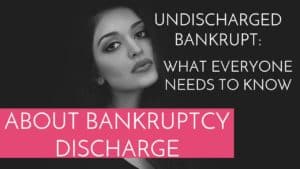Undischarged bankrupts: Declaring bankruptcy may not make all of your debts disappear
What? I thought the point of filing bankruptcy was to make all of a person’s debts go away.
For many years, people have used debt repayment strategies such as the debt snowball, debt avalanche and debt stacking to pay off their credit card debts and other unsecured liabilities. Each strategy has its own set of pros and cons in attempting to straighten out your financial affairs.
If you’re struggling with too much debt and you feel your financial affairs are in a mess, you can always try financial restructuring. This involves working with a licensed insolvency trustee to reorganize your finances. It is a sensible next step people take when they’re trying to get their debt under control.
Deciding to file for bankruptcy is never very easy, however, it may be the most effective choice for getting a fresh start to straighten out your financial affairs. If a do-it-yourself or restructuring method is not an option for someone after that bankruptcy will certainly be the required action.
Nobody likes to think of the possibility of personal bankruptcy, yet it is essential to understand the procedure. In this Brandon’s Blog post, I’ll discuss the insolvency process, what limitations are placed on individuals that have actually filed for bankruptcy and are still undischarged bankrupts, and also when in bankruptcy is the time financial obligations are gotten rid of.
Undischarged bankrupts: How bankruptcies work in Canada
The Canadian bankruptcy legislation is designed to help insolvent and not viable companies, or insolvent, honest but unfortunate people, obtain relief. Subject to trust claimants’ rights and the rights of secured creditors, the company or person is assigning all of their unencumbered assets to the licensed insolvency trustee.
After going through bankruptcy and being discharged, most of your debts will be gone. There are a few exceptions, but for the most part, you will be relieved of a great financial burden.
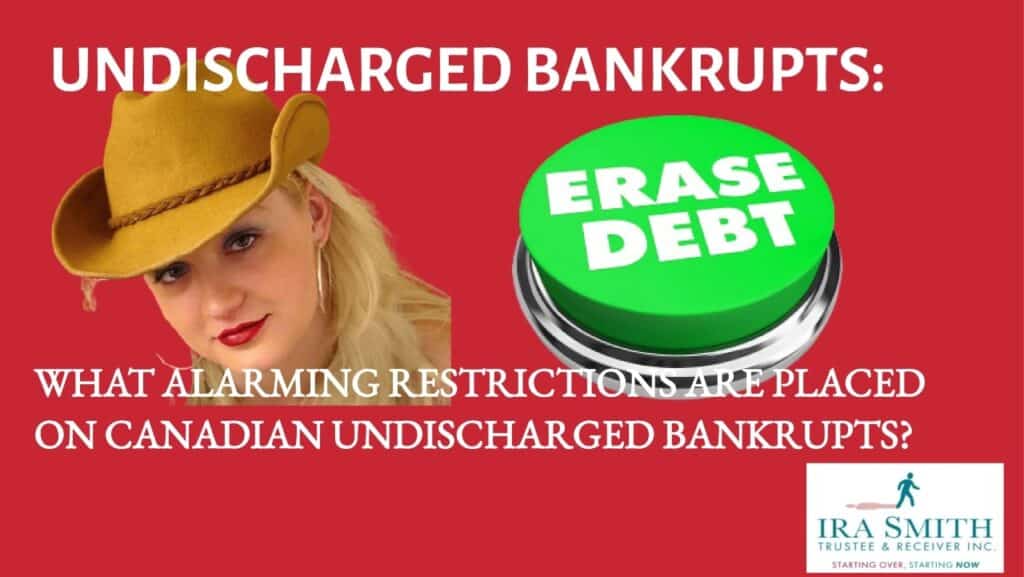
Undischarged bankrupts: Are there any debts not forgiven when I get my discharge from bankruptcy?
It’s crucial to remember that once undischarged bankrupts are released from bankruptcy, they are no longer responsible for the financial obligations they had at the time of bankruptcy. The discharge is a key part of this process, and it helps to give individual bankrupts a fresh start.
A bankruptcy discharge provides relief from most debts, except for:
- support payments for a former spouse or your children;
- penalties and fines assessed by the court;
- any financial debts resulting from fraud or fraudulent breach of trust; and
- student loans within the last seven years before your date of bankruptcy while you were a part-time or full-time student.
Additionally, the debts owing to secured creditors holding valid security fall outside of the bankruptcy process. Those secured loans must stay current or else the secured creditor can look to the default provisions of its loan in order to preserve their rights to collect.
Problems for undischarged bankrupts – What are the consequences of a bankrupt not being discharged?
The implications of not being discharged from bankruptcy are significant for undischarged bankrupts.
Being unable to obtain credit
If you are bankrupt (i.e., not discharged from bankruptcy), you may only borrow $1,000 or less without informing the lender (e.g., credit card company) that you are an undischarged bankrupt. If you fail to do this, it is an offence under the Bankruptcy and Insolvency Act Canada (BIA) and you could be fined and/or imprisoned.
Being unable to work in certain jobs or professions
Undischarged bankrupts in Canada, will not be able to work in certain jobs or professions. Examples are:
- If possible employment requires you to pass a security clearance, you may not be able to pass it. If you cannot pass, then you will not be hired.
- As someone who is not yet discharged from bankruptcy, you are not able to serve as a Director of a company.
- You cannot operate a trust account so that is a problem for certain professions such as real estate brokerage or lawyer.
- If you’re bankrupt and haven’t been discharged, you won’t be able to get bonded. So any jobs that require that are out of the question.
How long the information lasts on your credit report
The six to seven years AFTER your bankruptcy discharge that your bankruptcy information stays on your credit file is like a stain that just won’t come out. For undischarged bankrupts, the clock hasn’t even started ticking yet. Your credit score is negatively affected for anyone who goes bankrupt, especially for undischarged bankrupts.
Being subject to certain restrictions in relation to their property and finances
While you are an undischarged bankrupt, your property and finances are in play.
While you are an undischarged bankrupt, your property and finances are up for grabs! You cannot have any assets other than those allowed for by the exemptions allowed in the province where you live. So if you acquire any before your discharge from bankruptcy, they belong to your licensed insolvency trustee!
The most often cited examples are things that are out of your control, such as a windfall, like winning the lottery or getting an inheritance.
An undischarged bankrupt may be subject to having to make surplus income payments to their licensed insolvency trustee. The Office of the Superintendent of Bankruptcy Canada sets a minimum threshold in bankruptcy proceedings based on the person’s family income and the number of people in the household. That minimum threshold is essentially the Canadian poverty line. Any monthly income earned by an undischarged bankrupt above that minimum threshold set is subject to surplus income payments.
Essentially, one-half of the person’s monthly income, net of income tax, above the minimum, must be paid over. A licensed insolvency trustee administering the personal bankruptcy must recalculate the person’s obligation to pay, up or down, as the person’s income changes. The longer you remain an undischarged bankrupt, the longer your ability to keep all that you earn is restricted.

What is the meaning of undischarged bankrupts?
As soon as you declare personal bankruptcy, the individual bankrupt’s status is that of an undischarged bankrupt. People that have actually not yet gotten their discharge from personal bankruptcy are called undischarged bankrupts.
How does an individual bankrupt person get their discharge? By completing all of the required duties, including making full disclosure of all assets and liabilities to the licensed insolvency trustee and delivering non-exempt assets to the Trustee. You are expected to attend the two mandatory counselling sessions and any other meetings that may be called.
You are entitled to an automatic discharge after 9 months if you are a first-time bankrupt and do not need to pay surplus income. This assumes that you have met all of your obligations as an undischarged bankrupt, fully cooperated with the licensed insolvency trustee and that no creditor is opposing your discharge.
If you are a first-time bankrupt and subject to surplus income, you must pay it for 21 months before you are entitled to a discharge. Longer timelines apply if you are a second or more time bankrupt.
Suppose the Trustee has evidence that the bankrupt has not been forthcoming and cooperative, or has committed one or more bankruptcy offences. In that case, the Trustee needs to oppose the bankrupt’s application for discharge. Such undischarged bankrupts are not entitled to an automatic discharge. Unsecured creditors who have filed a proof of claim in the person’s bankruptcy on account of their unsecured liabilities may also object.
If your income tax debt is equal to or more than $200,000 and 75% or more of your total debt, you are not entitled to an automatic discharge either. If you have been bankrupt before, the Office of the Superintendent of Bankruptcy Canada may object. This would happen if they believe the person is abusing the Canadian bankruptcy system.
If you’re a secured creditor, you’re usually not affected by bankruptcy. That’s because bankruptcy is designed to help unsecured creditors with unsecured liabilities, not creditors who have a security interest in some or all of the bankrupt debtor’s assets. Secured creditors have the right to enforce their security, take possession of the asset(s) covered under the security, sell the asset(s) and get paid back all or a portion of their secured debt. Secured creditors who are not repaid in full after the sale of the secured asset(s), can file a claim in the person’s bankruptcy as an unsecured creditor for the unpaid unsecured liabilities.
Undischarged Bankrupts in Canada – Your Options
The Trustee is only responsible for filing an undischarged bankrupt’s application for discharge once in the bankruptcy proceedings. The system requires that the Trustee make the first application on their behalf. It is ultimately the responsibility of the bankrupt person to ensure that their application is filed.
If either the Trustee or one or more unsecured creditors oppose your application for discharge, the matter will need to go to a hearing in bankruptcy court. This will essentially put a hold on the bankruptcy proceedings until the court hearing.
Undischarged bankrupts are never sure what to do next. This is understandable, so, here are a few options to consider:
1. Contact your Trustee – They’ll be able to help you understand your options and what’s best for your situation. You’ll need to speak to your licensed insolvency trustee to find out why they’re opposing your discharge. It might be something as simple as not having had your second counselling session yet, or forgetting to give the Trustee some information or a document.
If the Trustee or creditor opposes your discharge for any reason, it may be more difficult to remedy the situation, but the best place to start is by talking to the Trustee and getting a copy of any notice of opposition filed.
This way, undischarged bankrupts can understand the issues preventing them from getting an automatic discharge from bankruptcy.
2. Get in touch with a bankruptcy lawyer – They can give you more specific advice about your options and what might be the best course of action for you. Undischarged bankruptcy may need to retain a bankruptcy lawyer for advice and representation in court.
3. File a consumer proposal – this is another option that might be available to you, depending on your circumstances. A consumer proposal filed by a bankrupt person that makes a sufficient offer to the unsecured creditors that is accepted and fully performed acts to annul the person’s bankruptcy. By doing this, the need for a bankruptcy discharge hearing is eliminated.

You owe money—The 5 types of bankruptcy discharges available to undischarged bankrupts
Automatic discharge from bankruptcy –
After you file for bankruptcy, you will be automatically discharged nine months later from your bankruptcy proceedings if:
- this is the first time you were ever bankrupt;
- unless your trustee, creditors, or the Office of the Superintendent of Bankruptcy oppose it;
- you have gone to your 2 mandatory counselling sessions;
- your income tax debt is less than $200,000 and less than 75% of your total debt; and
- you have not been told to pay surplus income to the bankruptcy estate.
If you do have to make payments, and you qualify for an automatic discharge, you will get it after 21 months of payments.
If this is your 2nd bankruptcy, after 24 months of bankruptcy, you may be eligible for an automatic discharge if you don’t have to make payments of surplus income.
If you need to pay surplus income and are bankrupt for the second time, you must pay this money to your Trustee for 36 months. After that, you qualify to be automatically discharged.
If you do not get an automatic discharge, then you are required to attend a bankruptcy court hearing to consider all the evidence to decide what type of discharge you are entitled to. The court has various options available.
Absolute order of discharge –
As part of the bankruptcy proceedings, there are many factors the bankruptcy court will consider when you apply for discharge. Some of these may include:
- What was your conduct before and during bankruptcy, as set out in the Trustee’s Section 170 Report?
- Did you attend the financial counselling sessions and pay any required surplus income to the Trustee for your creditors as agreed?
- How much do you earn annually?
- Do you have any assets that are exempt from seizure (such as RRSPs)?
- Do you have just one creditor, such as the Canada Revenue Agency or a litigation creditor?
The court will issue an absolute order of discharge if it is satisfied that there are no factors that would disqualify you from receiving your bankruptcy discharge immediately.
Conditional order of discharge –
If the court feels that your discharge should be conditional on you meeting certain conditions to obtain an absolute discharge, the court will order a conditional discharge.
This usually involves paying a certain amount of money over a set period of time. The court may also impose other conditions. Once you’ve met all the conditions, you’ll be given an absolute discharge.
Suspended order of discharge –
A suspended discharge is one that delays the absolute discharge to a later date. It can also be combined with a conditional order of discharge.
Refused discharge –
If the evidence demonstrates that the bankrupt individual is taking advantage of the bankruptcy process, has not worked cooperatively with the licensed insolvency trustee, or their conduct is deemed unacceptable, the court can refuse to grant a discharge.
In this instance, undischarged bankrupts must take measures to improve the situation before being able to apply again to court to hear the bankrupt’s application for discharge.
Undischarged bankrupts summary
I hope you enjoyed this Brandon’s Blog on undischarged bankrupts. Are you in need of financial restructuring? The financial restructuring process is complex. The Ira Smith Team understands how to do a complex restructuring. However, more importantly, we understand the needs of the entrepreneur or the person who has too much personal debt. You are worried because you are facing significant financial challenges.
It is not your fault that you are in this situation. You have been only shown the old ways that do not work anymore. The Ira Smith Team uses new modern ways to get you out of your debt troubles while avoiding bankruptcy. We can get you debt relief freedom.
The stress placed upon you is huge. We understand your pain points. We look at your entire situation and devise a strategy that is as unique as you and your problems; financial and emotional. We know that we can help you the way we take the load off of your shoulders and devise a debt settlement plan.
We realize that people and businesses in financial difficulty need practical advice and a workable solution in an easy-to-understand financial plan. The Ira Smith Team knows that not everyone has to file for bankruptcy in Canada. Most of our clients never do, as we are familiar with alternatives to bankruptcy. We assist many people in finding the relief they need.
Call or email us. We can tailor a new debt restructuring procedure specifically for you, based on your unique economic situation and needs. If any of this sounds familiar to you and you’re serious about finding a solution, let us know.
Call us now for a no-cost initial consultation.
